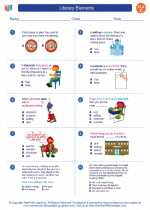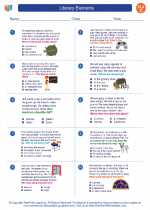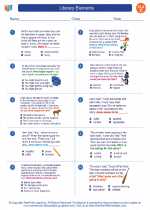Adjective: Explanation and Study Guide
An adjective is a word that describes or modifies a noun or pronoun. It provides more information about the noun or pronoun by giving details about its size, shape, color, age, and more. Adjectives make our language more descriptive and interesting, allowing us to paint a clearer picture of the world around us.
Types of Adjectives
There are several types of adjectives, including:
- Descriptive adjectives: These adjectives describe the qualities of a noun or pronoun, such as "big," "blue," "tall," "old," and "beautiful."
- Demonstrative adjectives: These adjectives point out specific nouns and pronouns, such as "this," "that," "these," and "those."
- Quantitative adjectives: These adjectives indicate the quantity or amount of a noun, such as "many," "few," "several," and "some."
- Interrogative adjectives: These adjectives are used to ask questions about a noun, such as "which," "what," and "whose."
- Proper adjectives: These adjectives are derived from proper nouns and are capitalized, such as "American," "Shakespearean," and "Italian."
Study Guide
To understand adjectives better, here are some study tips:
- Identify adjectives: Practice identifying adjectives in sentences. Look for words that describe or modify nouns and pronouns.
- Use adjectives in writing: Practice incorporating adjectives into your writing to make it more descriptive and engaging.
- Learn about degrees of comparison: Understand the different forms of adjectives when comparing nouns, including positive, comparative, and superlative forms.
- Expand your vocabulary: Explore new adjectives to enrich your language and express ideas more vividly.
- Play adjective games: Engage in fun activities and games that reinforce the understanding and usage of adjectives.
By mastering adjectives, you can enhance your language skills and become a more expressive communicator.
[Adjective] Related Worksheets and Study Guides:
.◂English Language Arts Worksheets and Study Guides Third Grade. Literary Elements
Worksheet/Answer key Literary Elements
Literary Elements  Worksheet/Answer key
Worksheet/Answer key Literary Elements
Literary Elements  Worksheet/Answer key
Worksheet/Answer key Literary Elements
Literary Elements 

 Worksheet/Answer key
Worksheet/Answer key
 Worksheet/Answer key
Worksheet/Answer key

The resources above cover the following skills:
Reading Standards for Literature
Key Ideas and Details
Describe characters in a story (e.g., their traits, motivations, or feelings) and explain how their actions contribute to the sequence of events. [RL.3.3]